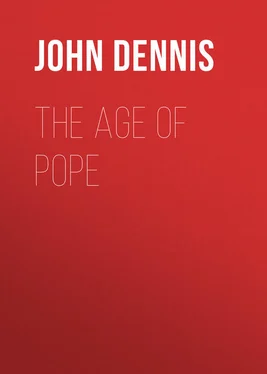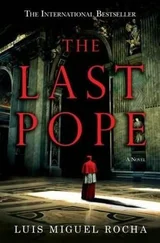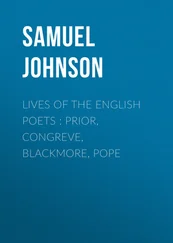John Dennis - The Age of Pope
Здесь есть возможность читать онлайн «John Dennis - The Age of Pope» — ознакомительный отрывок электронной книги совершенно бесплатно, а после прочтения отрывка купить полную версию. В некоторых случаях можно слушать аудио, скачать через торрент в формате fb2 и присутствует краткое содержание. Жанр: foreign_antique, foreign_prose, на английском языке. Описание произведения, (предисловие) а так же отзывы посетителей доступны на портале библиотеки ЛибКат.
- Название:The Age of Pope
- Автор:
- Жанр:
- Год:неизвестен
- ISBN:нет данных
- Рейтинг книги:3 / 5. Голосов: 1
-
Избранное:Добавить в избранное
- Отзывы:
-
Ваша оценка:
- 60
- 1
- 2
- 3
- 4
- 5
The Age of Pope: краткое содержание, описание и аннотация
Предлагаем к чтению аннотацию, описание, краткое содержание или предисловие (зависит от того, что написал сам автор книги «The Age of Pope»). Если вы не нашли необходимую информацию о книге — напишите в комментариях, мы постараемся отыскать её.
The Age of Pope — читать онлайн ознакомительный отрывок
Ниже представлен текст книги, разбитый по страницам. Система сохранения места последней прочитанной страницы, позволяет с удобством читать онлайн бесплатно книгу «The Age of Pope», без необходимости каждый раз заново искать на чём Вы остановились. Поставьте закладку, и сможете в любой момент перейти на страницу, на которой закончили чтение.
Интервал:
Закладка:
That he had many fine qualities in spite of the littlenesses which mar his character one would be loath to doubt. Among his nobler traits was an ardent passion for literature, a courage which enabled him to face innumerable obstacles – 'Pope,' says Mr. Swinburne, 'was as bold as a lion' – and a constant devotion to his parents, especially to his mother, who lived to a great age. There are no sincerer words in his letters than those which relate to Mrs. Pope. 'It is my mother only,' he once wrote, regretting his inability to leave home, 'that robs me of half the pleasure of my life, and that gives me the greatest at the same time,' and the lines expressing his affection for her are familiar to most readers. Truly does Johnson say that 'life has among its soothing and quiet comforts few things better to give than such a son.'
Among his lady friends the dearest was Martha Blount, the younger of two beautiful sisters, of whom Gay sang as 'the fair-haired Martha and Teresa brown.' They came of an old Roman Catholic family residing at Mapledurham, and were little more than girls when Pope first knew them. With the elder sister he quarrelled, but Martha was faithful to him for life, and when he was dying it is said that her coming in 'gave a new turn of spirits or a temporary strength to him.' Swift, as we have said, was one of the warmest of Pope's friends, and his letters to the poet are by far the most attractive portion of the published correspondence. He visited him at Twickenham more than once, and on one occasion spent some months under his roof. Bolingbroke, his 'guide, philosopher, and friend,' who for a time lived near to him at Dawley, was a frequent guest, so also, in the days of their intimacy, was Lady Mary, who had a house at Twickenham. Thomson the poet, too, lived not far off, and was visited by his brother bard, whom Thomson's barber describes as 'a strange, ill-formed, little figure of a man,' but he adds, 'I have heard him and Quin and Patterson 17 17 Quin (1693-1766) was the famous actor, and Patterson was Thomson's deputy in the surveyor-generalship of the Leeward Isles, and ultimately his successor.
talk so together that I could have listened to them for ever.' Arbuthnot, one of the finest wits and best men of his time, who, as Swift said, could do everything but walk, was also a faithful friend of Pope; so was Gay, and so was Bishop Atterbury, who, as the poet said, first taught him to think "as becomes a reasonable creature."
James Craggs, who had been formerly Secretary of State, and was on the warmest terms of intimacy with the poet, resided for some time near his friend in order to enjoy the pleasure of his society. When in office he proposed to pay him a pension of £300 a year out of the secret service money, but Pope declined the offer. Statesmen and men of active pursuits cultivated the society of the poetical recluse, and Pope, whose compliments are monuments more enduring than marble, has recorded their visits to Twickenham:
'There, my retreat the best companions grace,
Chiefs out of war, and statesmen out of place,
There St. John mingles with my friendly bowl,
The feast of reason and the flow of soul,
And he whose lightning pierced the Iberian lines 18 18 The Earl of Peterborough, the meteor-like brilliancy of whose actions forms one of the most striking chapters in the history of his time.
Now forms my quincunx and now ranks my vines.'
Among Pope's associates was the 'blameless Bethel,'
' – who always speaks his thought,
And always thinks the very thing he ought,'
and Berkeley who had 'every virtue under heaven,' and Lord Bathurst who was unspoiled by wealth and joined
'With splendour, charity; with plenty, health;'
and 'humble Allen' who
'Did good by stealth and blushed to find it fame;'
and many another friend who lives in his verse and is secure of the immortality a poet can confer.
The five volumes which contain the letters between Pope and his friends exhibit an interesting picture of the times and of the writers. The poet's own letters, as may be supposed from the thought he bestowed on them, are full of artifice, and composed with the most elaborate care. Every sentence is elaborately turned, and the ease and naturalness which give a charm to the letters of Cowper and of Southey are not to be found in Pope. His epistles are weighted with compliments and with professions of the most exalted morality. 'He laboured them,' says Horace Walpole, 'as much as the Essay on Man , and as they were written to everybody they do not look as if they had been written to anybody.' Pope said once, what he did not mean, that he could not write agreeable letters. This was true; his letters are, as Charles Fox said, 'very bad,' but some of Pope's friends write admirably, and if there is much that can be skipped without loss in the correspondence, there is much which no student of the period can afford to neglect. 'There has accumulated,' says Mark Pattison, 'round Pope's poems a mass of biographical anecdote such as surrounds the writings of no other English author,' and not a little knowledge of this kind is to be gleaned from his correspondence.
In the years spent at Twickenham Pope produced his most characteristic work. It is as a satirist that he, with one exception, excels all English poets, and Pope's careful workmanship often makes his satirical touches more attractive than Dryden's.
'To attack vices in the abstract,' he said to Arbuthnot, 'without touching persons, may be safe fighting indeed, but it is fighting with shadows;' and Pope, under the plea of a detestation of vice, generally betrayed his contempt or hatred of the men whom he assailed. No doubt the critics and Grub Street hacks of the day gave him provocation. Pope, however, was frequently the first to take the field, and so eager was he to meet his foes that it would seem as if he enjoyed the conflict. Yet there were times when he felt acutely the assaults made upon him. 'These things are my diversion,' he once said, with a ghastly smile, and it was observed that he writhed in agony like a man undergoing an operation. The attacks made with these paper bullets, not only on the side of Grub Street but on his own, show very vividly the coarseness of London society. Courtesy was disregarded by men who claimed to be wits and scholars. Pope held, perhaps, a higher place in literature in his own day than Lord Tennyson has held in ours, for the best beloved of Laureates had noble rivals and friends who came near to him in fame, while Pope, until the publication of Thomson's Seasons , in 1730, stood alone in poetical reputation. Yet he was reviled in the language of Billingsgate, and had no scruple in using that language himself. Late in life Pope collected the libels made upon him and bound them in four volumes, but he omitted to mention the provocation which gave rise to many of them. Eusden, Colley Cibber, Dennis, Theobald, Blackmore, Smyth, and Lord Hervey are among the prominent criminals placed in Pope's pillory, and the student of the age may find an idle entertainment in tracking the poet's thorny course, while he gives an unenviable notoriety to names of which the larger number were 'born to be forgot.'
In 1725 Swift had written to Pope advising him not to immortalize the names of bad poets by putting them in his verse, and Pope replied to this advice by saying, 'I am much the happier for finding (a better thing than our wits) our judgments jump in the notion that all scribblers should be passed by in silence.' How entirely his inclination got the better of his judgment was seen three years later in the Dunciad . The first three books of this famous satire were published in 1728. It is generally regarded as Pope's masterpiece, but the accuracy of such an estimate is doubtful. So heavily weighted is the poem with notes, prefaces, and introductions that the text appears to be smothered by them. It was Pope's aim to mystify his readers, and in this he has succeeded, for the mystifications of the poem even confound the commentators. The personalities of the satire excited a keen interest, and much amusement to readers who were not included in Pope's black list of dunces. At the same time it roused a number of authors to fury, as it well might. His satire is often unjust, and he includes among the dunces men wholly undeserving of the name, who had had the misfortune to offend him. To place a great scholar like Bentley, an eloquent and earnest preacher like Whitefield, and a man of genius like Defoe among the dunces was to stultify himself, and if Pope in his spite against Theobald found some justification for giving the commentator pre-eminence for dulness in three books of the Dunciad , his anger got the better of his wit when in Book IV. he dethroned Theobald to exalt Colley Cibber. For Cibber, with a thousand faults, so far from being dull had a buoyancy of heart and a sprightliness of intellect wholly out of harmony with the character he is made to assume.
Читать дальшеИнтервал:
Закладка:
Похожие книги на «The Age of Pope»
Представляем Вашему вниманию похожие книги на «The Age of Pope» списком для выбора. Мы отобрали схожую по названию и смыслу литературу в надежде предоставить читателям больше вариантов отыскать новые, интересные, ещё непрочитанные произведения.
Обсуждение, отзывы о книге «The Age of Pope» и просто собственные мнения читателей. Оставьте ваши комментарии, напишите, что Вы думаете о произведении, его смысле или главных героях. Укажите что конкретно понравилось, а что нет, и почему Вы так считаете.












